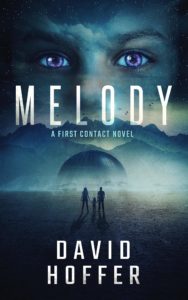
We’ve reached the finals of the second annual Self-Published Science Fiction Competition (SPSFC2), and my team will be reading all four of the seven finalists that we had not previously reviewed in the semifinals. And last on my list was an entry in one of my favorite subgenres: first contact. With my enjoyment of the subgenre combined with its scores in the first two rounds, I was excited to check out Melody by David Hoffer.
As so many first contact novels do, Melody opens—well, opens after the prologue—with the detection of an odd signal coming from deep space. The perspective sections are split between the lead scientist on the team that discovered it and a father whose daughter had been mysteriously fascinated with that exact sliver of sky. And then the military gets involved, and the reader is sent careening on a thriller plot full of cat-and-mouse chases alongside races to decode just what the signals mean.
One of my favorite parts of first contact novels is the wonder of new discovery—that feeling that the world is bigger than the characters had known, and that this change in understanding throws open the possibilities to nearly anything. And this is precisely the most effective element of Melody. It’s clear that the lead’s family has some sort of connection to the alien signal, but it’s totally unclear what that may be. Meanwhile, the signal itself has top scientists baffled. There’s mystery and wonder aplenty in a really intriguing initial hook.
But then the military gets involved. And they are as stubborn, unreasonable, and warmongering as the worst sci-fi villains. Perhaps it’s not entirely unrealistic—and there is indeed one darkly ironic and all-too-realistic passage where one of the chief war-mongers reflects on how lucky it is that first contact was made by America and not one of the bad guys—but it can be hard to buy into a plot powered by certain characters making the most obstinate and unreasonable choices at every turn. Even if it is realistic, the book still has to sell it. And perhaps thriller fans just accept that as part-and-parcel with the subgenre, but it was an impediment for me.
Unfortunately, as the book progressed, the first contact plot was not quite interesting enough to win me back from the thriller impediments. There are some mystical elements that I’m not sure entirely worked, and the story turned in a direction that was much more of a save-the-world thriller than any sort of cultural contact subplot. As save-the-world thrillers go, it’s not a bad one, I was just hoping for a little less thriller and a little more first contact.
Overall, a strong start full of the wonder of discovery helped Melody quickly grab my attention, but some flat villains and a second half that felt more like a generic thriller kept it from really distinguishing itself. It’s an easy read and a fine story if you’re looking for a sci-fi thriller, but without that extra element to really set it apart.
Can I use it for Bingo? Naturally, it’s Self-Published
Overall rating: 12 of Tar Vol’s 20. Three stars on Goodreads.
SPSFC score: 6/10 for my personal score. The official team score will be determined in concert with my teammates.
